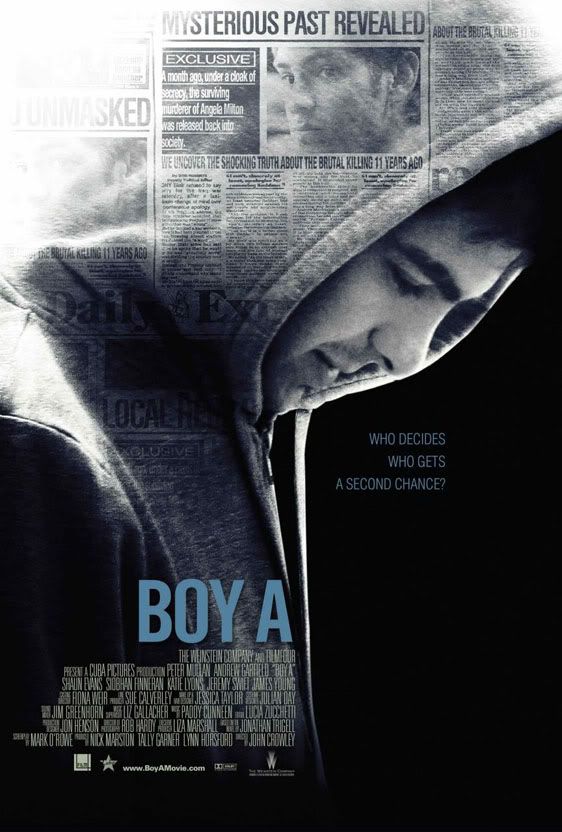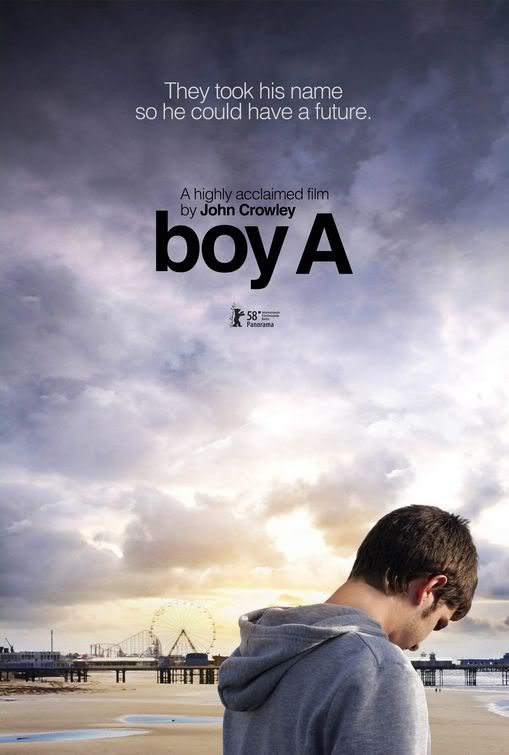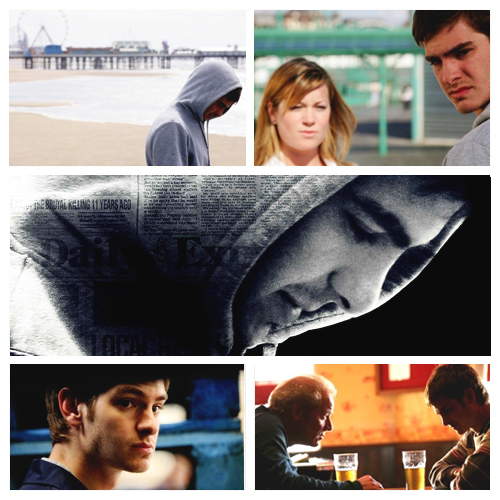BOY A (2007 - DRAMA / ROMANCE / CRIME) ***** out of *****
(Andrew Garfield... you, sir, are The Man...)



CAST: Andrew Garfield, Peter Mullan, Katie Lyons, Shaun Evans, Jeremy Swift, Alfie Owen, Taylor Doherty, Siobhan Finneran, Skye Bennett, James Young.
DIRECTOR: John Crowley.
WARNING: Some SPOILERS and some good reasons to keep a box of tissues next to your couch - straight ahead...
IT'S LIKE THIS: There's a new employee at IDV Deliveries in Manchester, England. His name is Jack Burridge (Andrew Garfield).
At first glance, Jack seems to be your average 24-year old guy. He's got the eager puppy dog energy of someone who can't wait to start his new job. He's got big brown doe eyes that look out onto the world as if he's seeing everything for the first time. He's got a quick easy smile that is undimmed by skepticism or experience, and wins over almost everyone he meets. And, most important of all, Jack has the unswerving loyalty of his gruff but loving Uncle Terry (Peter Mullan), who acts like Jack's guardian angel - keeping his distance but always ready to swoop in to protect and help Jack at any moment. In short, Jack seems to be a normal British twentysomething navigating his way through life.
But he isn't.
You see, Jack is a recently-released convict - and his real name is Eric Wilson. He was incarcerated when he was just a shy, impressionable 10-year-old boy (Alfie Owen). Young Eric fell in with a bad apple, another 10-year-old named Philip Craig (Taylor Doherty) with a horrible home life. Philip basically attacked and murdered a classmate and yanked Jack into the whole thing. Philip and Eric were prosecuted and referred to in the press as "Boy B" and "Boy A." Philip ended up committing suicide while in prison, while Eric soldiered on and eventually grew up. Now, he has been paroled - and has legally changed his name to Jack Burridge to start a new life. But there is also another reason: the crime was so sensationalized and notorious that he needs a new identity to keep himself safe from vigilantes and bounty hunters.
Also, Terry is not Jack's uncle. He is Jack's corrections officer, but his love for Jack is genuine and powerful - more than the love he feels for his own estranged son Zeb (David Murphy). Terry first met Jack when he was still the 10-year-old boy named Eric arriving at the jail after the conviction. Over the last fourteen years, Terry mentored Eric and watched over him until he was paroled and eventually grew up to become Jack. Terry is determined to see Jack succeed, and has set him up with that job at IDV Deliveries. Like a proud uncle - or father - Terry stands by and watches as Jack makes friends with Chris (Shaun Evans) and the rest of the crew. He watches also as Jack begins a romantic relationship with Michelle (Katie Lyons), the sarcastic but kind-hearted secretary at IGV Deliveries' front office. It seems like Jack has a new start on life - and he could not be happier. And Terry couldn't be prouder.
But... will Jack's past as Eric (and the horrible crime he committed with Philip) come back to haunt him? What happens when someone broadcasts an age-enhanced picture of Eric on TV? How long can Jack go on living his new life before someone puts two and two together? And what happens when Jack and Chris save a young girl from a car crash - and end up on the front page of the local newspaper as heroes? Will someone recognize Jack from the age-enhanced photo of Eric? If so, how will his friends react? Will Chris stand by him? Or abandon him? What about Michelle? Is her love for Jack so true that it can withstand the terrible secret from his past? And how can Terry protect this boy that he loves more than his own son? Will Terry have to make the ultimate sacrifice to save him? Can there be a happy ending for "Boy A"?
I wish I could say "yes." I really do...
BUT, SERIOUSLY: What makes a movie your favorite? What really does it for you? A great story? Engaging characters? Side-splitting humor? Chilling scares? Breathless thrills? Explosive action? Provocative themes? Romantic clinches? Cliffhanger endings? Great production values? What?
These were the questions that some friends and I pondered over Thursday Happy Hour earlier this month. One friend posited that it is impossible to have one favorite film. Rather, he said, we should have one favorite from each genre. If that's true, then my list would be: WEDDING CRASHERS (comedy), THE FOG (horror), ALIEN (sci-fi), WEEKEND & THE ENGLISH PATIENT (romances), REAR WINDOW & THE SILENCE OF THE LAMBS (thrillers), DIE HARD (action), LILO AND STITCH (animated), AND THEN THERE WERE NONE (mystery), CINEMA PARADISO & IL POSTINO (foreign), GREASE & THE SOUND OF MUSIC (musical), and for drama... well, until 2010 it was ORDINARY PEOPLE.
Another friend, however, disagreed that you couldn't have one favorite film above all else. Movies, he said, were just like people. Some you like. Some you dislike. Some you hate. Some you've never heard of. And some you love. And, among the ones you love, one is the love of your life. He suggested that the love of your life and your favorite movie both have one thing in common: they haunt you. They may not be perfect. They may sometimes annoy and infuriate you. They may challenge you and make you uncomfortable, and you may run or withdraw from them because you aren't ready to accept the challenge. But what they can do that no one else can, is lay bare the map of your heart - and find a permanent place in it, whether you care to admit it or not. In short, they stay with you. That one person who haunts you more than any other, my friend said, is the love of your life. And that one movie that stays with you more than any other, is your favorite film. And I couldn't agree more.
Out of all my favorites films, the one that stayed with me the most - haunted me - for the longest time was ORDINARY PEOPLE. That 1980 film was also Robert Redford's directorial debut, and tackled one well-to-do Chicago family's implosion in the wake of the older son's tragic accidental death - and the younger son's crippling sense of "survivor's guilt." While WEDDING CRASHERS, THE FOG, ALIEN, THE ENGLISH PATIENT, WEEKEND, DIE HARD, THE SILENCE OF THE LAMBS, LILO AND STITCH, AND THEN THERE WERE NONE, CINEMA PARADISO, IL POSTINO, GREASE, and THE SOUND OF MUSIC all have special places in my heart, it was ORDINARY PEOPLE that my thoughts would most often return to. It was the exquisitely perfect combo of great characters, subtle but powerful emotion, and timelessly great storytelling. Since I saw it as a kid, it was my favorite drama - and my favorite film.
Then, in 2008, I saw BOY A. And it devastated me like no other film I've ever seen. Even more than ORDINARY PEOPLE.
For years after that, I couldn't bring myself to watch BOY A again - or even talk about it. Not because it wasn't good. It was, in fact, a brilliant film. But it was also utterly heartbreaking, with a wrenching, beautifully hopeful and sad turn from Andrew Garfield - in his first major screen role that nabbed him a very much-deserved British Academy Of Film award - their equivalent of our Oscars. But I stayed away, because no one likes to get their heart broken again - and BOY A was sometimes difficult to watch. Nevertheless, the movie was never far from my thoughts. In short, it haunted me.
It wasn't until 2010, about two years after it was released on American DVD, that I watched it again when a friend who also loved it gave it to me as a gift. Even then, I was reluctant to pop it in the DVD player because I remembered how much it affected me. Nevertheless, I went ahead and watched it - and got my heart broken all over again. This time, though, it was different. This time, I embraced the pain. This time, I had to face the fact that, despite all my attempts to avoid the fact, I had fallen in love with BOY A. Or, in the words of REO Speedwagon's famous song: "I can't fight this feeling anymore..." This is the movie, out of all my favorites, that has stayed with me the most. This movie is The One. And just like that, BOY A became my new favorite drama - and my new favorite film.
Since BOY A's release in 2007 in England and then a year later in the United States, Andrew Garfield has rightfully gotten the attention of Hollywood. Based on his work in BOY A, Robert Redford cast him in LIONS FOR LAMBS, where Garfield held his own against Redford and a stellar cast that also included Meryl Streep and Tom Cruise. Garfield's performance in LIONS FOR LAMBS is especially noteworthy since it came so soon on the heels of BOY A. In BOY A, he played a shy, nervous, sweetly naive, damaged, working-class British lad; in LIONS FOR LAMBS, he does a 180 and plays a cocky, restless, jaded, sharply intelligent, upper-class American fraternity president. And the sharp contrast between the two performances is remarkable - it's as if we are watching two different actors. Such is the chameleonic power of Andrew Garfield.
He then went on to critical acclaim, continuing to play vastly different characters in THE IMAGINARIUM OF DR. PARNASSUS, NEVER LET ME GO, RED RIDING 1974, and THE SOCIAL NETWORK - for which he was nominated for a Golden Globe for Best Supporting Actor as Eduardo Saverin, the real-life co-founder of Facebook. There are those who say that Garfield was robbed of an Oscar nomination for THE SOCIAL NETWORK because of his relative youth. Some say that young, extremely talented performers are often overlooked at the Oscars on crowded years because the Academy figures they have their whole career to make their mark. The fact of the matter is Garfield should've been nominated for his bravura turn in THE SOCIAL NETWORK. Even without the awards he deserved, however, Garfield's consistently stellar work since BOY A allowed him to snatch the coveted role of Peter Parker/Spiderman away from over a dozen contenders, some more veteran and well-known than him. That takes true talent - and BOY A established Garfield as a rare and genuine talent.
BOY A is even more remarkable considering it is Garfield's first major film - and he has a very tricky character play. Eric Wilson/Jack Burridge has a dark past with a terrible crime lurking somewhere within it, but we have to be able to not just sympathize with him, but also empathize to an almost empathic level. There are those who say that the reason we end up siding with Jack so much is because director John Crowley (adapting from the best-selling novel by Jonathan Trigell) carefully parcels out only little slivers or information concerning Jack's crime - but keeps the majority of it hidden until towards the end. While he is holding those narrative cards close to his chest, we are getting to know Jack and see his attempts to start a new life by starting a new job, making new friends, be mentored by a loving father figure, and discovering romantic love for the first time. So much so, that by the time we find out in the third act the full story about Jack's crime, we have become so emotionally invested in his path to redemption, that it is impossible to lose any love for him.
While I agree that this tactic employed by Crowley to build sympathy and empathy for Jack is indeed clever and partly responsible for the degree to which care for Jack so much, the primary reason we become willing participants in his journey is because of the actor who plays him - Andrew Garfield. Few performers today have the emotional transparency that Garfield has - with complex emotions and thoughts visibly rippling across his face like wind on water. The only other person acting today whom I've seen with this quality is Julia Roberts. That phrase "a face with a language of its own" was coined for Andrew Garfield and Julia Roberts.
From the very opening moment of BOY A, where Jack is getting his pre-release briefing from Terry (Peter Mullan), he hooks us in with one look. Jack is staring at Terry with the open trust and wide-eyed innocence of a child, and the way Garfield plays this scene immediately gives us an "in" to this character. Then, barely a minute later, Jack receives a gift from Terry and reacts in the way of someone who has not known much kindness in life. Garfield not only uses his beautifully expressive face to convey Jack's inner workings - he also uses his body language to tell a story like any great actor should.
Watch the shy, shaky way he hugs Terry: it says more about their relationship than words ever could. Jack has a certain nervous, bouncy, yet affable energy that underscore his vulnerability. Also, watch the scene at the dance club (my favorite scene) where someone tricks Jack into taking Ecstacy: this leads to Jack dancing up a storm in an euphoric fever. He doesn't have to worry about the past. He doesn't have to worry about the present. He doesn't have to worry about the future. He can just be. Great, great scene that plays with purely images and action - and no words. Garfield sells this scene by letting Jack's vibrant body language tell the story.
This coltish, puppy-like quality easily wins him friends at his new job and the attentions of the receptionist, Michelle (Katie Lyons), whose straightforward bluntness both intimidates and intrigues him. But Michelle's sarcastic exterior belies a huge, generous heart underneath, and she instantly recognizes the lost soul under Jack's sweet exterior. And just like that, an unlikely romance is born.
Unfortunately, the past cannot stay buried, and Jack's secret past eventually comes calling. Another theme of BOY A is how the smallest gestures can have significant consequences, for good or bad. In separate scenes, Terry and Michelle give Jack special gifts and presents, which give him joy and helps him lower his guard. Terry's unfailing loyalty to Jack is what inspires him to succeed with his new life, to make Terry proud. And part of that new life is to form a solid relationship with a girl - Michelle. Michelle's open heart and generous nature triggers Jack's desire to tell her about his past - so that he can share everything with her. However, Terry strictly warns him that he must never do this. He must forget the past, Terry says, and move on. Ironically, however, in a slip of the tongue to his own son Zeb (David Murphy) while they are drinking, Terry triggers the events that will make it impossible for Jack to move on - and lead to the film's wrenching finale. Ultimately, BOY A is a moving tapestry of actions and gestures that trigger more actions and gestures, which trigger even more actions and gestures - which ultimately lead to an inevitable and inescapable destination.
In the end, though, BOY A is a movie that you have to feel. Structurally and technically, it is not perfect. Emotionally and artistically, however, there is no better film out there that examines the true nature of good, evil, love, loyalty, friendship, and forgiveness. Andrew Garfield is absolutely wonderful - and so is his stellar supporting cast. And I am proud to call BOY A my favorite movie of all time.
In closing, I present to you my favorite scene from BOY A: the dance scene where Jack is truly happy and unconcerned about what is behind and what lies in front of him. For just a few minutes, he is truly free:
And Andrew Garfield winning the Best Actor Award at the 2008 BAFTA Awards in London, England:
Then being interviewed backstage a few minutes later: